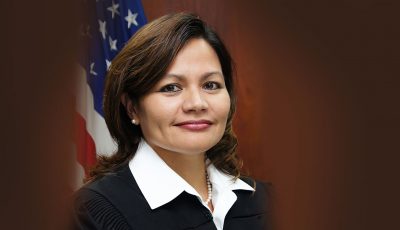Manila given last chance to amend lawsuit
The federal court has given inmate Reynaldo A. Manila his last opportunity to amend his lawsuit against former Department of Corrections commissioner Robert Guerrero and two other DOC officials over his blind left eye.
U.S. District Court for the NMI Chief Judge Ramona V. Manglona granted Guerrero’s motion to dismiss the claims against him in Manila’s lawsuit.
Manglona, however, allowed Manila to amend his lawsuit on when and how Guerrero learned about his need for eye surgery, and any actions Guerrero took because of that.
The judge said this will be Manila’s last opportunity to make his case.
Guerrero, who is currently the Department of Public Safety commissioner, was the DOC commissioner when Manila, an inmate, was diagnosed with retinal detachment in his left eye.
Manila sued Guerrero and DOC officials Georgia M. Cabrera and Jose K. Pangelinan in their personal capacity for alleged violation of his right to medical care.
Cabrera used to serve as DOC commissioner, while Pangelinan served as acting DOC commissioner when Guerrero was transferred to DPS. Cabrera and Pangelinan are still with DOC.
Guerrero and Cabrera had asked for the second amended complaint to be dismissed for failure to state a claim. Pangelinan did not join in that motion to dismiss.
In Cabrera’s case, Manglona denied her motion to dismiss with respect to Manila’s claim concerning delay in his cataract surgery.
Manglona, however, granted Cabrera’s motion to dismiss any allegation of liability for the delay in Manila’s surgery for retinal detachment.
Manila underwent eye surgery in Guam on Jan. 9, 2018. Four months later, Manila said he was examined and told that he is permanently losing vision in his left eye.
He said defendants denied and delayed his treatment, resulting in his blindness.
In her order resolving the motion to dismiss, Manglona said Guerrero maintains that none of Manila’s exhibits show that he was aware of the need for retinal surgery.
Guerrero points out that the administrative regulations make the Division (not department) of Corrections “responsible for the healthcare of the prisoners in its custody.”
Manglona said in sum, Guerrero argues that it was not his job to deal with day-to-day inmate medical issues.
As to whether the DOC commissioner or a subordinate director of the Division of Corrections had direct responsibility over major medical decisions, this is not a question that can be decided at this stage of the litigation, Manglona said
“It is not apparent from statutes and regulations in the public record that the commissioner lacks authority to take control of such a decision and could not, in fact, have been the ultimate decision maker in this instance,” the judge said.
By statute, Manglona said, the commissioner is the top administrator of DOC, and the Department is “responsible for all adult correctional services.”
Manglona said while the day-to-day operation of the adult correctional facility may fall to the director of the Division of Corrections, nothing in the DOC’s enabling statute would prevent the commissioner from taking charge of a major decision concerning medical services, for which by statute he or she is ultimately responsible.
Furthermore, the judge said, the viability of the administrative regulations for the Division of Corrections, to which Guerrero refers for support, has been seriously called into question.
Manglona said whether Manila’s medical crisis had come to the attention of the commissioner already during Guerrero’s tenure, which must have ended in late November or early December 2015, is far from clear from the second amended complaint.
Manglona said Manila’s opposition brief to the motion to dismiss adds a new allegation that Guerrero “arranged a hearing to the Board of Parole for commutation of my sentence.”
Manila alleges that Guerrero wanted him released from DOC custody so that DOC won’t have to respond to his medical need.
Manila further alleges that then-commissioner Guerrero called him into his office, along with Cabrera, and told him to direct any questions about his medical needs to then-Corrections captain Cabrera.
Manila alleged that Cabrera was involved in arranging for his sentence to be commuted.
Manglona said these new allegations require further amendment.
Manglona said without any clear indication in the actual pleadings that Guerrero was aware of Manila’s condition during the remaining few weeks of his tenure as commissioner, the second amended complaint fails to state a claim against Guerrero personally and the claim against him must be dismissed.
The judge said Manila, however, is allowed to amend the complaint to allege Guerrero’s role in seeking a commutation of plaintiff’s sentence and his meeting with Guerrero and Cabrera.



























